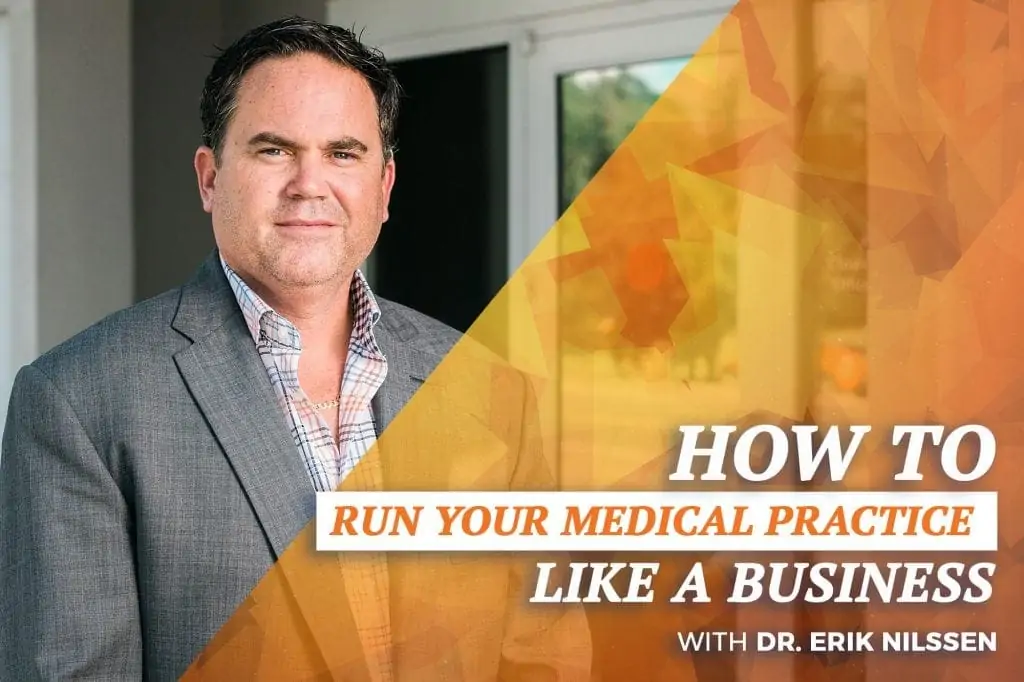Subscribe: RSS
Dr. Erik Nilssen is a board-certified orthopedic surgeon specializing in foot and ankle surgeries. He’s our featured guest today on All Things Business for Physicians.
You’ll learn the following in this episode:
- How innovation helps him achieve autonomy.
- What he means by a “medical pie chart.”
- Why embracing the negative emotions associated with entrepreneurship is essential to success.
- How studying regressive families can help you develop a healthy workplace environment.
- Why Dr. Nilssen believes so many physicians struggle with running a business (and why he often recommends going out on your own anyway).
- Where and why medical school curriculums drop the ball.
- The importance of delegation.
- How seeking patient feedback is essential to building a better business.
- How Dr. Nilssen has figured out the balance between his professional and personal life.
- Why the morning is the most important time of his day.
- How he helps diversify his income.
Our summary of Dr. Nilssen’s interview can be found below:
- Understanding the different personalities of your team is key to getting the most out of your company. Dr. Nilssen has spent a lot of his own time researching his own business personality (self-described as innovative or pioneering, based on research from the Harvard Business Review), which has helped him drive and lead his practice.
- “The way you can control something is if you own it.” This realization has helped Dr. Nilssen take more personal responsibility, ultimately opening the door to owning his own practice, purchasing medical real estate, and even expanding his business in the way he sees fit.
- Insecurity, doubt, rejection, isolation: all of these negative issues are part of opening and owning your own business. Dr. Nilssen wants listeners to be aware that you need to be willing to accept and deal with these feelings because ultimately you have no choice but to if you want to succeed.
- According to Dr. Nilssen, the stereotypical physician has had limited real-life experience by the time he or she is out of medical school, and little to no explicit training in business. This, in combination with the rapidly changing healthcare, insurance, and reimbursement culture, imposes a significant challenge on doctors. He points out that the reimbursement process is vastly different today compared to 20 years ago, but the medical school curriculum hasn’t kept up, ultimately placing the burden of business education on the individuals.
- Delegating was a hard habit for Dr. Nilssen to develop, but one he credits with revolutionizing his business. By divvying up tasks appropriately based on abilities, he feels it’s helped his team succeed, helped him manage his time more effectively, and ultimately deliver more efficient and positive outcomes for his patients.
- Struggling to run a business? Get real. “Why are we struggling?” Ask this question within your team first, Dr. Nilssen says, then seek external advice from friends, colleagues, and loved ones. This way you can apply your insights, figure out just how dedicated you (and your employees) are to make it work. Other questions to consider: Can you even find out how to cut the bottom 10 percent of your quarterly expenses? Can you clearly identify your assets and liabilities? The more you ask, the more you’ll learn and the better you’ll lead.
As far as the best advice he’s ever been given? “If you take a risk, you might fail. But if you don’t take a chance, you’re definitely going to fail.” Of course, he doesn’t see hoping or wishing as a strategy, so he takes it upon himself to make changes, take risks, read, and live with what he calls the habit of intention.
Resources from this podcast:
- http://hbr.org (Harvard Business Review).
- Good Leaders Ask Great Questions by John C. Maxwell.
- The Purpose Driven Life by Rick Warren
You can reach Dr. Nilssen via email at mdnilssen@gmail.com.




